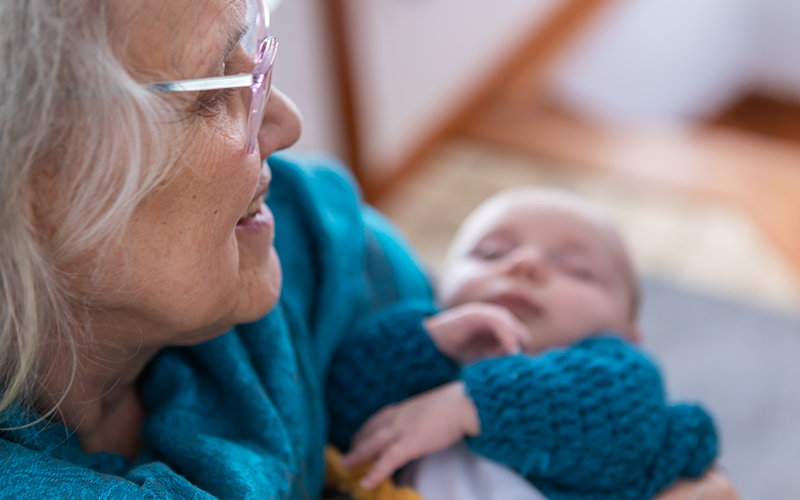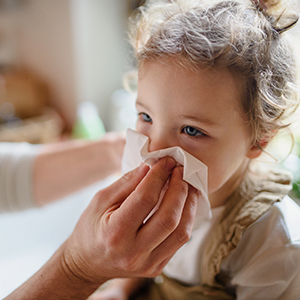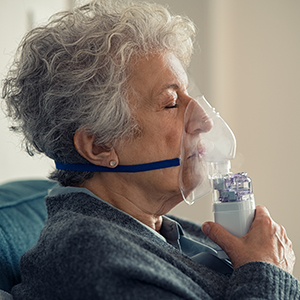Respiratory Syncytial Virus (RSV): A Threat to Children and Older Adults

Respiratory syncytial virus (RSV) is a common respiratory virus that causes mild, cold-like symptoms. It is spread by coming into contact with fluid from an infected person’s nose or mouth – through either inhaling droplets from an infected person’s sneeze or cough or touching a contaminated surface and then touching your eyes, mouth, or nose. Most people recover within a few weeks, but RSV can be serious – particularly among infants and older adults.
In children, RSV is so common that nearly all kids get RSV by the time they turn two. In many cases, parents and caregivers may be unaware that their child’s illness is caused by RSV. That’s because early symptoms of RSV include runny nose, a cough, and decreased appetite – much like that of a common cold.
RSV's cold-like symptoms are seemingly harmless – but it’s important to be aware that this virus can cause severe – even life-threatening – symptoms, especially in children, older adults, and people with certain chronic heart or lung conditions, compromised immune systems, or other medical issues. Each year, approximately 58,000 children under age five, including one in 100 babies under age six months, are hospitalized with RSV. In older adults, an estimated 60,000-160,000 are hospitalized annually due to RSV, and about 10,000 die. (Source: CDC).
How Do You Know If It’s RSV?

RSV is more common in winter and early spring months. Symptoms usually start within 2 – 5 days after contact with the virus. The most common symptoms of RSV include:
- Congested or runny nose
- Low-grade fever
- Cough
- Headache
Seek immediate medical attention if you or your child shows any of the following signs or symptoms:
Severe RSV Symptoms in Children
- Poor feeding or appetite
- Short, shallow breathing or struggling to breathe (chest muscles and skin pull inward with each breath)
- Irritability
- High fever
Severe RSV Symptoms in Adults
- Wheezing
- High fever
- Difficulty eating, drinking, or swallowing
- Worsening cough
- A bluish tint to the skin
How is RSV Diagnosed and Treated?
In most cases, like many viruses, RSV can be treated at home through plenty of fluids, rest, and over-the-counter medications such as ibuprofen or acetaminophen to reduce fever or pain (parents: avoid giving aspirin to children). If you suspect you have RSV or a contagious respiratory virus, it’s important to stay home or keep sick children home to help stop the spread.
If you or a loved one’s symptoms are getting worse, seek help immediately. RSV can be diagnosed through a physical exam, and in some cases, providers will test for the virus via a nasal swab or wash. Treatment will depend on age, severity of symptoms, and general health. Because RSV is caused by a virus, antibiotics won’t address it. Instead, treatment is focused on easing symptoms and may include:

Antiviral medicine. Some people with severe infections may need treatment with an antiviral medicine.
More fluids. It's very important to stay hydrated. In more severe cases requiring hospitalization, an IV line may be used to administer fluids and electrolytes.
Oxygen. Extra oxygen can be given through a mask, nasal prongs, or an oxygen tent.
Suctioning of mucus. A thin tube can be used to remove extra mucus from the nose and upper airway.
Bronchodilator medicines. These may be used to open the airways. They are often given in an aerosol mist by a mask or through an inhaler.
Tube feeding. This may be done if a baby has trouble sucking. A thin tube is put through the baby’s nose and down into the stomach. Liquid nutrition is sent through the tube.
Mechanical ventilation. A person who is very ill may need to be put on a ventilator to help with breathing.
Talk with your healthcare provider about the risks, benefits, and possible side effects of all treatments.
Can You Prevent RSV?
Much like other respiratory viruses, RSV can be prevented. The best ways to prevent RSV include consistently washing your hands, wearing a mask around others when you’re sick (or you’re around those who are sick), and stay home when ill. New RSV vaccines are also available for certain populations.
To reduce the risk for RSV in infants, the American Academy of Pediatrics (AAP) recommends that all babies, especially preterm infants:
- Be breastfed when possible
- Be protected from contact with smoke
- Avoid childcare scenarios that expose your baby to many other children during his/her first winter season
- Abstain from contact with sick people
- Make sure that household members wash their hands or use an alcohol-based hand cleaner before and after touching your baby.
Who's Eligible for an RSV Vaccine?
In fall of 2023, the CDC approved RSV vaccines for adults 60 and older, for infants up to 8 months old and born during their first RSV season, for a small group of children between 8 and 19 months old during their second RSV seasons, and for pregnant women during 32-36 weeks. This vaccine helps you or a child develop immunity to RSV without becoming sick and is the most effective way to prevent serious complications from RSV.
Eligible babies may receive their RSV vaccine with other childhood vaccines. Eligible adults should consult their healthcare provider for guidance on when to receive their RSV vaccine.
Questions? Ask a Nurse
If you have immediate questions about specific symptoms, call Munson Healthcare Ask-A-Nurse at 231-935-0951. Our nurses are answering questions 24 hours a day at no charge to you.
Munson Healthcare’s Virtual Urgent Care is also available to assist with urgent illnesses and injuries that can't wait for a doctor's visit. Available for adults and children over the age of 3.